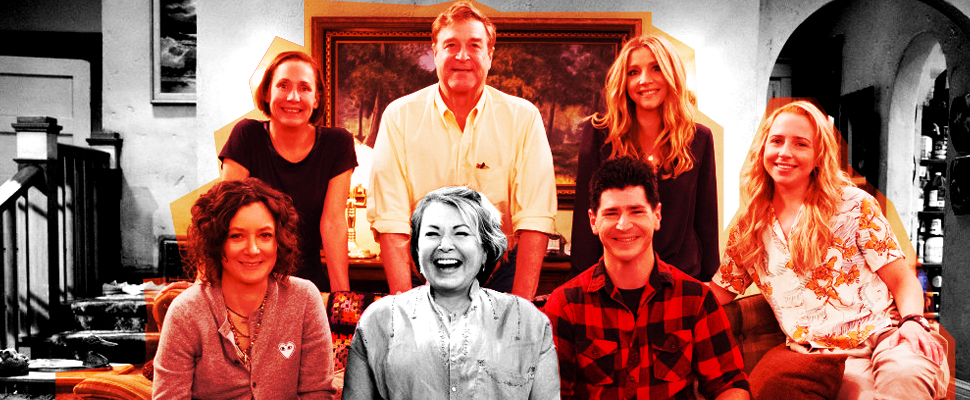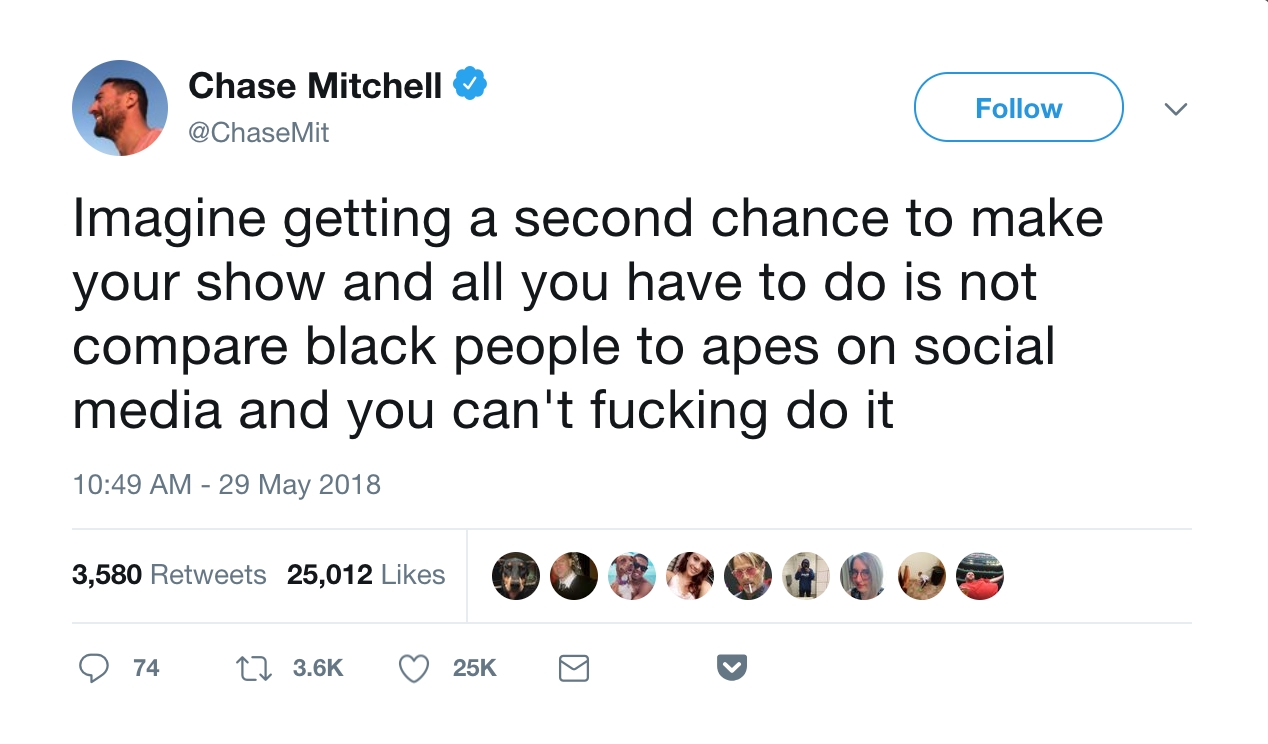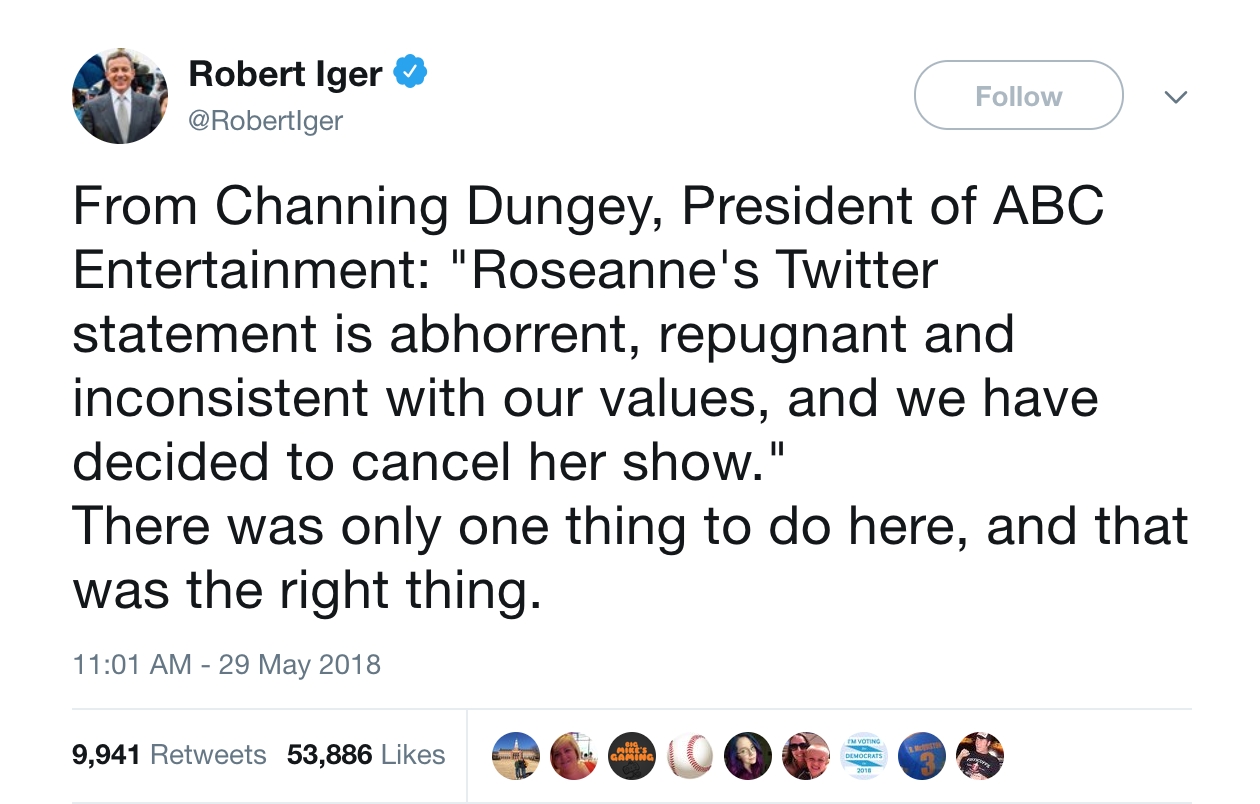
Lovers of free speech should be excited today. Ditto for lovers of the free market. In one fell swoop, Roseanne Barr illustrated the power of both concepts handily. She exercised her First Amendment rights by tweeting out a deeply racist remark about Valerie Jarrett, a former advisor to Barack Obama; and the marketplace quickly responded by torpedoing her recently revived sitcom, as if it was all one Ambien-induced fever dream. But there’s no $108 million payoff waiting this time around — just angry castmates, repulsed producers, joke-laden critics, and a few loyal fans offering limp defenses that Barr herself wants nothing to do with.
The rapid turn of events can be viewed through any number of prisms, though free speech and the free market are particularly potent because they’re highly valued by a subset of working-class fans of Roseanne and her Trump-aligned politics. Barr will not be jailed for her vile opinions; she’s welcome to them, thanks to the Constitution. Meanwhile, the television industry — rapidly responsive and ever-prone to correcting the overvaluations of once bankable entities — snapped into action: Barr’s show was canceled, reruns were pulled, and her reps dropped her, all within 24 hours. Paired together, the lenses of free speech and free market highlight a bigger idea, one that advocates of racism-under-the-guise-of-First-Amendment-freedoms are all too prone to forget: Even behaviors that are protected by law can have costly consequences.
At some point in this cycle, virulent alt-right conservatives will compare the fallout of Barr’s tweets to some sort of state-sponsored censorship. It’s not. ABC, the network in question, acted in response to a board and shareholders, rather than a government mandate. Channing Dungey, president of ABC Entertainment, looked like a genius by greenlighting the Roseanne reboot. Now she looks brave for making the call to kill it. Both of these things can be true at once. The world changes quickly and Dungey, the company she represents, and its parent company, Disney, all know how to recognize dead weight. They employ longterm thinking, are beholden to audience opinions, and wouldn’t dare take on the ill will that would come from supporting a racist, even if Barr’s tweets wouldn’t completely poison the show’s ratings in season two.
The whole case study reflects a cycle of actions and reactions that any Ayn Rand-loving libertarian or MAGA-hat-wearing conservative ought to be thrilled by. And it’s exactly what our society needs: Humans forced to evolve and think deeper about how they treat one another, not as a result of legislation, but as a result of society’s own arc toward respecting dignity for all and how that arc affects the businesses we patronize.
In short: Our culture will not stand for bigotry, so if you act like a bigot you should expect a reckoning. If you employ a bigot, you should rethink the relationship — before the bigot-haters pull their support, thereby making you less money.

If this sounds to you like “the PC brigade gets to decide what’s on television” know that it both is and isn’t that. Yes, Twitter has given a voice to people historically marginalized by our society, people who now have the chance to speak out about offenses that were previously all too easily ignored. But studio heads are driven by a profit motive, and so, while they surely hear the complaints about any number of people in their employ, it’s going to be the ones whose offenses are too large to be drowned out by their bankability that actually lose their jobs due to behavior. It’s values-based corporate coercion conducted by a populace that votes with their dollars (or, in this case, their eyeballs).
Remember before you claim “left-wing censorship ruins everything,” that Dave Chapelle didn’t get the rug pulled out from him because of his trans jokes, Jeffery Tambor is still on Arrested Development after being fired from Transparent over inappropriate behavior, and Apu is still on The Simpsons in light of the discussion created by Hari Kondabolu’s recent documentary. You may believe that further actions were necessary in any or all of these cases, or that the fact that they didn’t result in firings or cancellations are examples of bad behavior/ taste being tolerated in the entertainment industry, but you certainly can’t view the situations above and then claim that public outrage is here to steal all of your favorite things.
Clearly, studios know well enough to handle these situations on a case-by-case basis. In this case, they responded to a particularly egregious example of racism by a person who has a history of similar behavior. It was a straightforward call morally, ethically, and financially.

So what of it? What are the larger societal implications of a racist rich person losing the chance to get richer due to her continually avowed racism?
Well, they’re quite large, actually. We’re a world torn asunder by tremendous upheaval. And while racists, sexists, transphobes, and enemies to equality everywhere seem to be crawling out of deep crevasses in our fractured landscape all too often, there’s clearly a mass of citizens keenly interested in fighting against them. The Roseanne cancellation proves that one of the tools moving forward for those pursuing a more just nation is the free market — beloved by those who might otherwise prove resistant to the current progressive social revolution.
The swift actions of ABC come in response to a nation that is clamoring for justice, but it was also a smart business decision. Those forces, taken in tandem, will help to motor a vital movement. It’s not censorship, it’s simple cause and effect.
